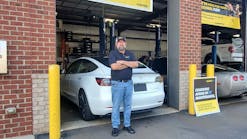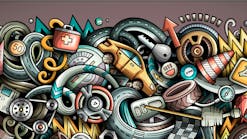Tools are essential for any auto mechanic shop. A quick lube shop may be more concentrated in its scope, requiring a core set of tools that help mechanics get each customer's vehicle through the bay. That doesn't mean shops should just stick with the tools they have and not look for upgrades.
While some tools are basic requirements, mechanics will learn to grow their toolbox with essentials that help get the job done in a time that lives up to the "quick" in quick lube. It's appropriate, and even necessary, to always be on the lookout for new tools that will make the job easier. While a shop owner or manager might go to every resource for education, a few good places to start include networking events, conferences, and sales reps. New employees can also be a good resource, as they may have used different tools at a previous job or have experience with new processes from training they have undergone.
The Challenge
Starting and maintaining a shop is a challenge. A core set of tools goes a long way in helping mechanics serve customers in the appropriate time. Some tasks can be completed with only the basics, however, the right set of tools will streamline the process and get cars through the shop at a faster rate.
"The first primary tool set a quick lube needs is a full assortment of filter wrenches," says Jeff Smith, vice president of key accounts at Service Champ.
There are more tools for the essential tool kit, which shops should consider their core equipment. Smith continues with a list of essential tools and equipment every shop should have: "Most of the filters can be removed with an end cap wrench, but they will also need an assortment of band filter wrenches. The shop also needs at least a 3/8-inch socket set, along with a full assortment of both standard and metric wrenches. We also recommend shops prioritize screwdrivers and a hex bit set."
In a pinch, service can be pulled off with minimal tools. The situation is not ideal. It can add time and extra work for mechanics, slowing the speed of a customer's visit. It is wise to invest in essential equipment to speed service and make things easier for work to get done.
"We do run across shops that are missing the proper tools," Smith tells NOLN. "Without proper tools, the job takes longer than it should."
Each vehicle that goes through the shop will require more labor and more time for service. This can end up costing the shop in the long run, and furthers the case for building that essential set of equipment to support mechanics in their job and better spend resources like time and energy.
The Solutions
Look broadly for resources to learn about new tools, equipment, and practices, Smith explains.
"When managing a quick lube, you are getting information from every source you can," he says. "Networking events and conferences seem to be where most shop owners gain the knowledge on what new items are available."
Suppliers can help with sourcing and even education on how to use new equipment. If an owner returns from a conference and needs help finding that tool a colleague told him about, a supplier might be the best resource to match the tool.
A shop can also inquire with a supplier when a process is taking more time than expected. There might be a better solution out there but it's still necessary to ask about it.
Further, ask a new employee what tools they have used in the past that might not be in the shop. The new tool or process could save time and money while better serving customers.
The Aftermath
Adoption of new tools will typically add efficiency without much time spent learning a new tool or system. If a shop owner or manager isn't sure why certain equipment will be essential, it can help to ask for more information on how it can be used to make work more efficient.
"In most cases, a new tool or process is easily received because it makes the job easier or faster," states Smith. "But we always try to focus on how it benefits the quick lube team when we are walking them through how to use the tool."
Building up the equipment essentials in the shop's tool supply is necessary for staying competitive and up to speed with technology. The process never ends. Once a new tool is added to the essential kit and improves efficiency, it might be time to look for another tool to add to the process.
"Shops should always be looking for a new tool or piece of equipment that makes their job more efficient," Smith says. "It's this focus on continuous improvement and thinking about what's next that will keep shops ahead of the curve."
The Takeaway
Technology is driving a need for new tool adoption. Advancing technology in vehicles, including autonomous driving features and EV adoption, requires new and advanced tools.
"As vehicles are modernized and become more complex, it's critical for those in the industry to stay up to date on the tools required to perform the quick lube service. A quick lube's primary supplier is a great resource for information and new tools," Smith States.
"One of the most recent trends we are seeing is the migration from air tools to cordless electric tools. We have recognized those trends and, as a result, have brought in a new full line of industry-leading cordless tools to offer our Service Champ customers."
Adoption of new tools takes time and adds expense, however the effort pays off. Equipment essentials make it easier for shop employees to do their job, speed up time spent with each vehicle, and can sometimes add safety. In addition, advanced tools that become essential can increase car count and customer retention.






